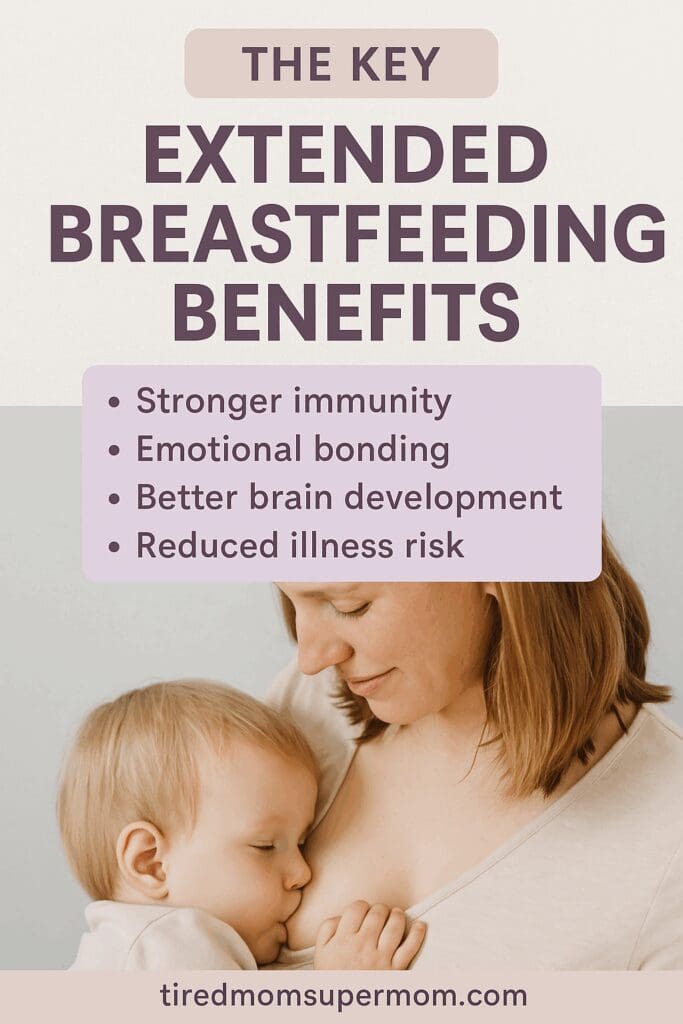The Key Extended Breastfeeding Benefits Every Mom Should Know
Extended breastfeeding benefits include stronger immunity, enhanced emotional bonding, better brain development, and reduced risks of illness—for both baby and mom.
It also supports maternal mental health and can offer practical advantages like convenience and cost savings.
Learn what the science says, what real moms experience, and how to make extended breastfeeding work for your family.
In this post, we’ll explore the most important extended breastfeeding benefits and how they can support both you and your child well into toddlerhood.
Heads up: This post may include affiliate links. As an Amazon Associate, I earn from qualifying purchases—at no extra cost to you. Full privacy policy and disclosure here.

Why Consider Extended Breastfeeding?
Breastfeeding beyond infancy often sparks debate—but the benefits of extended breastfeeding are both real and research-backed. Whether you’re nursing a 1-year-old, a toddler, or even preschooler, you’re offering more than just comfort. You’re continuing to nourish, protect, and emotionally support your child in powerful ways.
Let’s explore what makes extended breastfeeding worth considering—and how it can positively impact your parenting journey.
What Is Extended Breastfeeding?
Extended breastfeeding refers to nursing a child beyond 12 months of age. While this may be common in many parts of the world, it’s sometimes misunderstood in Western culture.
Health organizations like the World Health Organization and American Academy of Pediatrics recommend breastfeeding for 2 years or more, as long as both mother and child wish to continue.
1. Immune System Support That Grows With Your Child
Breast milk evolves over time, adapting to your child’s needs. Even after the first year, it remains rich in:
- Antibodies to fight illness
- Enzymes and hormones that boost immunity
- White blood cells for long-term protection
This continued immune support is especially valuable as toddlers start daycare or preschool, where they’re exposed to new germs daily.
🛒 Helpful product: Elderberry immune drops for toddlers can be used alongside extended breastfeeding for an immune boost during cold season.
2. Emotional Security and Attachment
One of the most powerful extended breastfeeding benefits is emotional bonding.
Nursing provides:
- Comfort during tantrums, teething, or transitions
- A safe space during developmental leaps
- A soothing bedtime or nap routine
This close physical and emotional contact fosters a secure attachment, which can lead to better self-regulation and confidence in children.
📍 Related post: Breastfeeding After Going Back to Work
One of the most overlooked extended breastfeeding benefits is how it supports your child’s growing brain and emotional resilience.
3. Cognitive and Brain Development
Breast milk contains long-chain polyunsaturated fatty acids like DHA, which are essential for brain development. Studies have shown that children who are breastfed longer may score higher in certain areas of cognitive testing.
Even beyond infancy, breast milk continues to contribute to:
- Memory development
- Language acquisition
- Emotional intelligence
🛒 Smart addition: Nursing pillows can help maintain comfortable positioning as your toddler grows.
4. Nutritional Benefits for Toddlers
Did you know breast milk continues to offer high-quality nutrition well into toddlerhood?
It contains:
- Protein and healthy fats
- Calcium, magnesium, and potassium
- Vitamin A and B12
- Enzymes that aid digestion
For picky eaters or kids with food sensitivities, extended breastfeeding can help fill nutritional gaps.
📍 Explore more: Diaper Bag Essentials for Newborn Must-Haves
5. Fewer Illnesses and Hospital Visits
Research has shown that children who are breastfed longer have fewer ear infections, less diarrhea, and reduced respiratory issues.
The antibodies and immune factors in breast milk act like a personalized health defense system. This not only keeps your child healthier but reduces your stress (and doctor bills).
🛒 Prevention booster: Toddler probiotics pair well with breast milk’s natural defense system.
6. Supports Maternal Health, Too
The benefits of extended breastfeeding aren’t just for baby. Moms enjoy health perks too, such as:
- Lower risk of breast and ovarian cancers
- Reduced likelihood of type 2 diabetes
- Improved postpartum weight loss
- Delayed return of fertility (though not a reliable birth control)
Nursing also stimulates the release of oxytocin, which helps reduce stress and strengthen the mother-child bond.
Among the extended breastfeeding benefits for mothers are reduced risks of certain cancers and improved emotional well-being thanks to oxytocin release.
7. Convenience and Cost Savings
Breastfeeding beyond a year can reduce your need for:
- Expensive toddler formulas
- Additional snacks on outings
- Bottles, cups, and sterilization equipment
It’s a free, portable, always-available source of nourishment and comfort—especially useful during travel or transitions like moving or weaning.
🛒 Recommended: Portable breastfeeding cover for comfort and privacy on the go.
8. Better Sleep—for Everyone
Toddlers often fall asleep easier and sleep more soundly when nursing is part of the bedtime routine. The hormones in breast milk naturally promote sleepiness, and the act of breastfeeding helps calm an overstimulated child.
Bonus: It can also reduce night waking when your toddler is teething or unwell.
📍 Try this next: Essential Breastfeeding Station Checklist Guide
9. Cultural and Global Normalcy
In many parts of the world, extended breastfeeding is the norm—not the exception. Normalizing it here begins with education and awareness.
By continuing to nurse, you’re joining millions of mothers who embrace extended breastfeeding benefits without shame.
🛒 Parenting resource: Breastfeeding journey book for moms to feel empowered through every stage.
10. Easier Transitions and Gentle Weaning
Children who are breastfed into toddlerhood often self-wean gradually, leading to less resistance and stress for both mom and child.
This child-led approach supports autonomy and trust.
Stronger sense of independence when the child is ready
Gentle weaning = fewer tears
Better communication between parent and child
💬 Join the Conversation
Have you experienced the benefits of extended breastfeeding firsthand? Share your story in the comments!
❓ FAQ: Extended Breastfeeding Benefits
How long should I breastfeed my child?
The extended breastfeeding benefits supported by the WHO include immunity support, nutritional value, and emotional bonding beyond the infant stage.
Is there any nutrition in breast milk after 12 months?
Absolutely. Breast milk continues to provide protein, vitamins, and immune support well into toddlerhood.
Will extended breastfeeding make my child overly dependent?
No—research shows that securely attached children actually grow into more confident and independent individuals.
Can I combine extended breastfeeding with formula or solids?
Yes! Many parents use a mixed feeding approach. See our formula feeding hacks for helpful tips.
Do I need to supplement vitamins if I breastfeed past a year?
Not necessarily, but always consult your pediatrician. Breast milk is highly nutritious, but your doctor can advise based on your child’s needs.
The extended breastfeeding benefits covered here are all backed by research and real-life experiences, making the decision to continue feel a lot less daunting.
📌 Want to remember these extended breastfeeding benefits later? Pin this post to your motherhood board!

